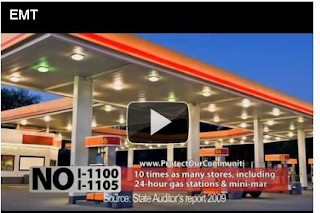Some small retailers worry about I-1100, too.Despite the Washington Association of Neighborhood Stores cuddly name, it isn't only about "independent" "neighborhood" stores, unless your neighborhood is a highway rest stop. The organization is dominated by large chains of gas station mini-marts. Its board of directors includes executives from the 103 store Plaid Pantry chain, BP, the 7-Eleven Franchise Owners Association and local gas station chains like Yorkston Oil. Here are some photos of WANS members.
"It's wide open and means volume discounts for Costco and other large stores, which makes it very competitive for the smaller stores," said T.K. Bentler, executive director and lobbyist for Washington State Neighborhood Stores [sic], a group of 500 independent convenience stores.
And who is the beer industry's NO on 1100 "Protect Our
So... Let's see if we can get the NO on 1100's overall argument straight. It's okay (not great, but not worth changing the law over) to allow gas station mini-marts to sell beer at current prices between 6am and 2am. But if 1100 allows consumer-driven competitive pricing, they won't be able to compete against larger retailers (against whom they are currently able to compete selling every other product even though there's competitive pricing on every other product). But even though they supposedly can't compete selling alcoholic beverages, there will still be a lot more of them selling scotch until 2am, which is somehow infinitely more dangerous than selling beer until 2am.
Of course this makes no sense whatsoever as a public safety argument. The real motivations here are that the beer industry doesn't want competition from other forms of alcohol. And nobody who currently wants to sell beer at prices which are artificially inflated by government-enforced anti-competitive restraints wants to give up their inflated prices. But inventing imaginary public safety problems makes better television than asking voters to vote to preserve pointlessly higher prices.



No comments:
Post a Comment